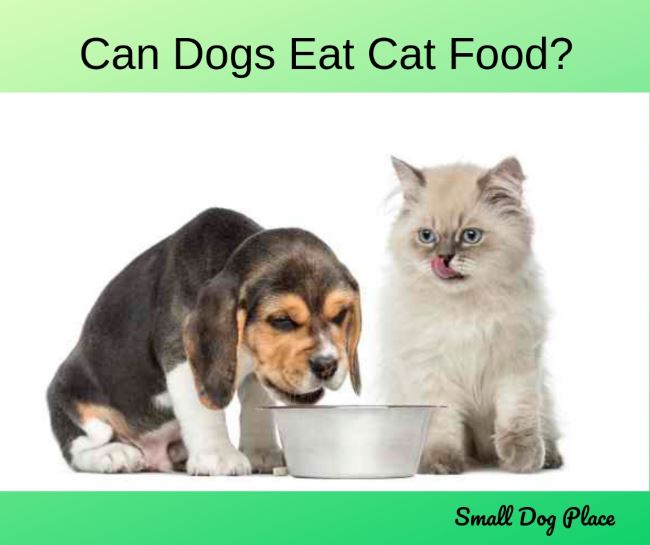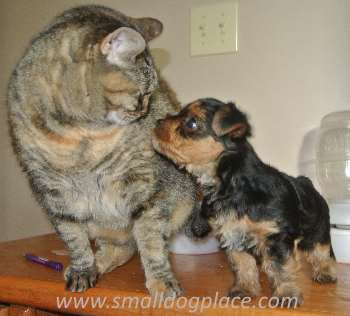- Small Dog Place Home
- Feeding
- Can Dogs Eat Cat Food
Can Dogs Eat Cat Food?
Can Dogs Eat Cat Food? By Emily Parker
Dogs regard cat food like we view chocolate -- utterly blissful! The pull to indulge is likewise irresistible. So, you can understand why some dogs favor cat fare over their own chow.
Having found this post, you must have a pup with a history of nabbing your kitty’s food. Maybe your little guy even jumps up on the counter like he’s trying to convince you that he’s actually a cat!
Aside from your cat being mortified, food theft raises health concerns. Is it risky?
Well, that depends. Read on for whether feasting on cat food is safe for your pooch and vice versa. Kitties are known to snatch food from their dog pals, too!
 Can Dogs Eat Cat Food?
Can Dogs Eat Cat Food?Can Dogs Eat Cat Food? Dietary Contrasts
The dietary needs of dogs and cats are markedly different with respect to meat, protein, essential amino acids, fatty acids, carbohydrates, and vitamins.
Meat
Your cat must consume animal protein to get the key nutrients they require. For your dog to stay healthy, their diet can include both animal and plant foods.
The canine digestive tract is specially designed to process plant fiber. However, the roughage in commercial dog food is too difficult for cats to digest, causing stomach upset.
 Can Dogs Eat Cat Food?
Can Dogs Eat Cat Food?Protein
Pound for pound, the protein quota for cats is roughly twice that of dogs. This is why cat food is high in meat-based protein. Since meat has the delightful scent and flavor your dog loves, cat food has a magnetic attraction.
However, dogs can only process a certain amount of protein. Any excess is burdensome to their kidneys and liver, making the organs work harder to eliminate it. Consequently, dogs who routinely gobble cat food can develop kidney and liver diseases.
Another canine side effect of too much protein is frequent tooting! Unused protein ferments in doggy digestive tracts, producing gas. Other signs of protein overload are vomiting, diarrhea, and weight gain.
Amino Acids
Protein consists of organic compounds called amino acids. used to form tissues, muscles, bones, hormones, and enzymes. Your pets also need amino acids to grow sleek fur. While cats and dogs can self-produce some amino acids, others must be supplied by food, termed "essential."
Taurine
One amino acid crucial for cats is taurine. A dietary shortfall causes blindness, deafness, and heart disease. Rich sources of taurine are shrimp, salmon, clams, sardines, scallops, and meat.
Additionally, cat food manufacturers typically add taurine to their products. However, since canines can synthesize this amino acid, it's not always present in commercial dog formulas.
Arginine
Another amino acid felines can't make is arginine. To prevent ammonia toxicity, your cat needs arginine in every meal. Ammonia is a byproduct of protein metabolism. Arginine converts ammonia to urea, which is eliminated through urine.
If ammonia doesn't exit a cat's body, it builds in the blood to life-threatening levels.
To ensure cats get enough arginine, it's routinely added to commercial cat foods, which means it may be too much for your pup. It's also naturally present in turkey, beef, chicken, and seafood.
Fatty Acids
Like amino acids, cats and dogs can self-produce some fatty acids but not others.
Arachidonic acid is a fat required for digestion, blood clotting, and healthy skin.
While dogs can synthesize arachidonic acid, felines cannot. For this reason, it's present in commercial cat formulas but not usually dog food.
Regarding dietary fat, cats require 9 percent, whereas dogs need only 5 percent. Therefore, canines who frequently wolf down cat food are prone to obesity and pancreatitis, which is life-threatening.
Red flags for pancreatitis include a hunched back, weakness, fever, appetite loss, and a distended abdomen, a dog flinching in pain when touched. If you see these symptoms, head to the vet immediately! Diarrhea and vomiting can also signal your dog is eating too much fat.
Note that kitten food is especially off-limits for dogs, being higher in fat and protein than adult cat formulas.
Carbohydrates
So far, you've learned that cats need higher ratios of meat, protein, and healthy fat than dogs. Carbohydrates are a different story. Pooches require more.
While felines get most of their energy from dietary fat, dogs are fueled by carbs. Consequently, commercial dog foods are high in carbohydrates, making them unsuitable for cats.
Vitamins
Thiamine
Cats require more thiamine than dogs! Therefore cat food is usually packed with it in quantities that are far greater than what your dog needs to be healthy.
If your kitty doesn't get enough of this B vitamin, they're vulnerable to seizures and other neurological problems. Signs of thiamine deficiency are a dull coat, hunched posture, and loss of appetite.
To protect your cat, avoid giving them raw fish since it contains an enzyme that destroys thiamine.
Niacin
Another vitamin felines can't produce is niacin. Insufficiency leads to impaired vision, mouth sores, loss of appetite, scraggly fur, and weight loss.
Since niacin converts food into energy, cats also become lethargic when they don't get enough. This B vitamin is plentiful in animal protein.
Vitamin A
Your pets need this vitamin for the health of their skin and eyes. Your dog can make Vitamin A from beta-carotene. However, since your kitty lacks this ability, their Vitamin A must come from food.
A stellar source is liver. Although some commercial dog foods may have supplemental Vitamin A, the amount may be inadequate for your cat.
Can Dogs Eat Cat Food?
By now, you probably know the answer to the question, Can Dogs Eat Cat Food. Whether your cat or dog is guilty of food stealing, there are several ways to intervene.
- Serve each pet on separate floors, inaccessible by the other. For example, assuming you have two levels in your home, feed Kitty on the upper floor and Pooch on the lower, with each level secured by a baby gate or door. If you don’t have two levels, find separate rooms.
- Designate a food station for Kitty on a high counter or shelf, unreachable by Pooch.
- Feed your pets in adjoining rooms, separated by a baby gate. Since you have a small dog, it shouldn't be able to leap over the partition.
- Play with one pet while the other eats, followed by putting any leftover food away.
- Schedule different mealtimes for each pet, with someone on hand to monitor eating, preventing sneaky nibbling.
- Feed your cat in a room behind a closed door. For convenient access, you could install an electronic pet door, activated by a remote on Kitty's collar. The device will keep your small dog from also using the door.
THE TAKEAWAY From Can Dogs Eat Cat Food?
Food theft is most serious when committed by your cat. If
Kitty favors dog food over cat formulas, their health will quickly decline,
impaired by insufficient meat, protein, essential amino acids, fatty acids, and
vitamins.
Regarding Pooch, occasionally snacking on cat food won't hurt, unless they have a sensitive stomach. In that case, you may see telltale vomiting or diarrhea.
However, regular feasting can result in canine kidney and liver diseases, pancreatitis, weight gain, and a smelly household from released gas.
A foolproof feeding system is vital for both your pets. Once you're all set, treat yourself to a small piece of chocolate!
Did You Find Can Dogs Eat Cat Food, helpful? May we suggest
Emily Parker, Author of Can Dogs Eat Cat Food?
Emily Parker is a cat mom to two black cats, Gus and Louis. When she's not out exploring the neighbourhood looking for new cat cafes, she helps other cat parents love their kitties better by writing at Catological.com
About Janice (author and voice behind this site)
Having lived with dogs and cats most of her life, Janice served as a veterinary technician for ten years in Maryland and twelve years as a Shih Tzu dog breeder in Ohio.
Her education includes undergraduate degrees in Psychology with a minor in biology, Early Childhood Education, and Nursing, and a master's in Mental Health Counseling.
She is a lifelong learner, a dog lover, and passionate about the welfare of animals. Her favorite breed for over 50 years has been the Shih Tzu, but she has also lived with Poodles, Maltese, Yorkshire Terriers, Beagles, English Bulldogs, Carin Terriers, and a Cocker Spaniel.
When not writing, reading, and researching dog-related topics, she likes to spend time with her eight Shih Tzu dogs, husband, and family, as well as knitting and crocheting. She is also the voice behind Miracle Shih Tzu and Smart-Knit-Crocheting
Does This Article Deserve Your Thumbs Up?
We always appreciate your support and encouragement. Your thumbs up means so much to us. Please like this article.
If you find this page or any page on Small Dog Place Helpful, or useful in anyway, I'd love it if you would click the small heart found on the bottom right of each page.
You can also share or bookmark this page -- just click on the:

Free Monthly Newsletter
Sign Up for Our Free Newsletter and get our Free Gift to You.
my E-book, The Top 10 Mistakes People Make When Choosing a Dog (and how to avoid them)

